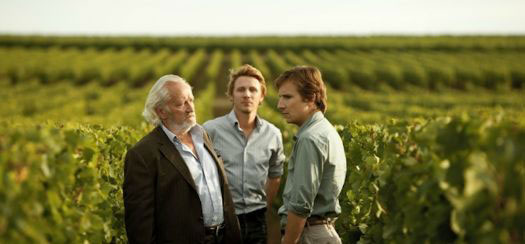Title: YOU WILL BE MY SON (Tu seras mon fils)
Cohen Media Group
Director: Gilles Legrand
Screenwriter: Gilles Legrand, Delphine de Vigan
Cast: Niels Arestrup, Lorant Deutsch, Patrick Chesnais, Nicolas Bridet
Screened at: Review 2, NYC, 2/12/13
Opens: March 29, 2013
It’s only natural for fathers and mothers to want their sons and daughters to choose work similar to their own; that is, if the work done by the older generation is meaningful to society, enjoyable to themselves, and of course lucrative. A lawyer with an independent office, a doctor with her own practice, will want their children to take over their offices when retirement or death ensues. There’s an exception, however, and it’s a poignant one. If a professional person has a son or daughter considered to be incompetent, weak, somehow missing the qualifications for the job, then that young person is going to be resentful, even more so if the parent chooses someone outside the family to take over the responsibility.“
You Will Be My Son,” written and directed by Gilles Legrand (whose “Malabar Princess,” also a family-centered drama, concerns a man who leaves his eight-year-old son with the boy’s father-in-law), is deep into family histrionics with “Tu seras mon fils.” The father, Paul de Marseul (Niels Arestrup), owns a vineyard said to be worth thirty million euros, embracing a manor that houses hundreds of bottles of various vintages, and employs several workers to pick the grapes. His son, Martin (Lorant Deutsch) is a good administrator but is said to have no nose for the product. The young man, who despite his dorky looks has a beautiful wife, Alice (Anne Marivin), asks for more responsibilities, but his dad holds him back. In fact the old man had depended on the talents of a long-term estate manager, François (Patric Chesnais), who is dying of pancreatic cancer and whose place would shortly need to be filled. Paul’s dream of an heir appears near fulfillment when François’ confident son Philippe (Nicolas Bridet), returns home to France from his job at Coppola wines in California, a bright, handsome boy who attracts Paul’s affections and ambitions as the fellow to take over his own dad’s job.
If Paul comes across as a bastard it’s largely because he is a heartless manipulator, a trait that stood him well as owner of the vineyard but which continues to widen the schism between him and young Martin. If Paul hands Martin a few more responsibilities, it’s not out of a feeling that the boy could learn on the job. Quite the opposite: Paul intends to continue humiliating his own son throughout the story. Nor should we expect a Hollywood ending that would have father and son embrace each other and reconcile all differences.
We in the audience do not learn much about wine that we do not already know, but oenophiles among us might be tempted to jump into the theater screen like a kid tempted with chocolate ice cream, to take our share of the products on display—as we’d expect Paul Giamatti’s character, Miles, in Alexander Payne’s “Sideways,” to do. A study of wine, however, is not the principal point of the drama any more than prescription drugs are the main objective in Steven Soderbergh’s wonderful thriller “Side Effects.” The battles among people who have known one another for decades and in one case between Martin and François’ golden-boy son Philippe (who in one scene take a bath in grapes while staying at a two thousand euros a night hotel in Paris), are in the forefront.
The story is compelling: most of all, “You Will Be My Son” (the “you” being Philippe and the “my” being Paul), soars because of Niels Arestrup’s Oscar-worthy performance as the rich older man whose contempt for his own son had begun as early as the latter’s birth. Arestrup, whose stomach doubtless projects the actor’s love for the output of some fine French chefs, was last seen in the U.S. as grandfather in Steven Spielberg’s “War Horse.” His résumé of thirty-seven films includes most in supporting roles, but his presence in “You Will Be My Son” is so authentic that if you were to meet him on the street you’d think of him as a connoisseur of the grape rather than as an actor. This is a superb production with Yves Angelo’s widescreen lensing likely to cause purveyors of foreign films to become Francophiles.
Unrated. 101 minutes © 2013 by Harvey Karten, Member, New York Film Critics Online
Story – A-
Acting – A
Technical – A-
Overall – A-

